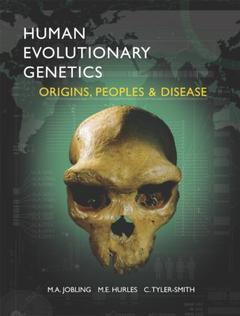Description
Human evolutionary genetics : Origins, Peoples and Disease
Authors: JOBLING M.A., HURLES M.E., TYLER-SMITH C.
Language: English
Subjects for Human evolutionary genetics : Origins, Peoples and Disease:
Approximative price 68.11 €
Subject to availability at the publisher.
Add to cart
Publication date: 08-2003
458 p. · 21x28 cm · Paperback
458 p. · 21x28 cm · Paperback
Description
/li>Contents
/li>Comment
/li>
Human Evolutionary Genetics is a groundbreaking text which for the first time brings together molecular genetics and genomics to the study of the origins and movements of human populations. Starting with an overview of molecular genomics for the non-specialist (which can be a useful review for those with a more genetic background), the book shows how data from the post-genomic era can be used to examine human origins and the human colonisation of the planet, richly illustrated with genetic trees and global maps. For the first time in a textbook, the authors outline how genetic data and the understanding of our origins which emerges, can be applied to contemporary population analyses, including genealogies, forensics and medicine.
Section 1: Introduction. 1. Why Study Human Evolutionary Genetics? Section 2: How do we study Genome Diversity? 2. Structure, Function and Inheritance of the Human Genome. 3. The Diversity of the Human Genome. 4. Discovering and Assaying genome Diversity. Section 3: How do we Interpret Genetic Variation? 5. Processes Shaping Diversity. 6 Making Inferences from Diversity. Section 4: Where and When did Humans Originate? 7. Human Apes. 8. Origins of Modern Humans. Section 5: How did Humans Colonise the World? 9. The Distribution of Diversity - Out of Africa and into Asia, Australia and Europe.10 Agricultural Expansions.11. Into New Found Lands.12. What Happens When Populations Meet? Section 6: What use is an Evolutionary Perspective? 13 Understanding the Past and Future of Phenotypic Variation. 14. Health Implications of Our Evolutionary Heritage.15 Identity and Identification.
Human Evolutionary Genetics is a revolutionary textbook which combines the study of genetics, anthropology and forensics to provide an understanding of human evolution and population histories.
© 2024 LAVOISIER S.A.S.
These books may interest you

Human Evolutionary Genetics 103.03 €

PhylogenomicsA Primer 96.92 €

Quantitative Genetics 90.27 €

